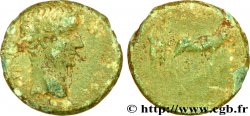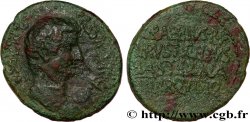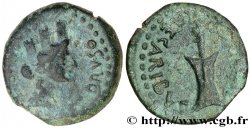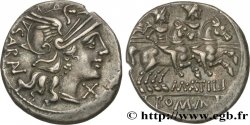v32_0128 - TIBERIUS Coin monétaire de revers avec un denier enchâssé
MONNAIES 32 (2007)
Starting price : 4 800.00 €
Estimate : 7 500.00 €
Realised price : 4 800.00 €
Number of bids : 1
Maximum bid : 7 205.00 €
Starting price : 4 800.00 €
Estimate : 7 500.00 €
Realised price : 4 800.00 €
Number of bids : 1
Maximum bid : 7 205.00 €
Type : Coin monétaire de revers avec un denier enchâssé
Date: c. 15-37
Mint name / Town : Gaule, Lyon
Metal : iron
Weight : 162 g.
Rarity : UNIQUE
Coments on the condition:
Objet monétiforme en très bon état de conservation avec un denier enchâssé. Objet digne des plus grandes collections ou musées
Obverse
Obverse legend : TI CAESAR DIVI - AVG F AVGVSTVS.
Obverse description : Tête laurée de Tibère à droite (O*).
Obverse translation : “Tiberius Cæsar Divi Augusti Filius Augustus”, (Tibère César fils du divin Auguste, auguste).
Reverse
Commentary
Ce coin nous a été déposé par son propriétaire après étude par le Cabinet des médailles de la BnF. Ce coin, haut de 36,5 millimètres, large de 31,5 millimètres pèse 162 g. La partie gravée fait 18,5 millimètres au niveau du grènetis. Ce coin est à notre avis composé de deux parties distinctes, probablement en fer trempé supportant la gravure et enchâssé dans un support tronconique de fer, certainement de fer doux, présentant un petit bourrelet dans la partie la plus large. Un denier de Tibère au type PONTIF MAXIM est enchâssé et bloqué à l’intérieur. La partie métallique analysée semble antique et le denier enchâssé paraît être en argent. Nous serions en présence pour la première fois d’un coin qui permettrait d’établir une liaison de coin pertinente, mais il paraît impossible sans risquer de détériorer l’objet de dessertir le denier enchâssé. Nous devons donc avoir l’empreinte du revers au type de la Paix (Livie) assise à droite avec la légende PONTIF MAXIM. Jean-Baptiste Giard dans son Catalogue des monnaies de l’Empire romain, II, de Tibère à Néron, Paris 1988 a recensé douze coins monétaires p. 7-8, pl. I. Quatre exemplaires proviennent de de la trouvaille de Paray-le-Monial (Saône-et-Loire), trouvés en 1863 et conservés aujourd’hui au musée de la ville ou au musée des Antiquités nationales de Saint-Germain-en-Laye. Six coins ont été trouvés à Auxerre (Yonne) en 1799 dont quatre exemplaires sont conservés au Cabinet des médailles de la BnF et deux autres au musée monétaire de la Monnaie de Paris dont un est perdu. Un onzième exemplaire a été découvert à Vertault en Côte-dor, mais semble aujourd’hui perdu. Enfin le dernier a été trouvé à Ostie. Notre exemplaire a été retrouvé dans un buffet ancien situé dans une cave au hameau de "Pey" à Poule-les-Écharmaux (69) dans le Haut Beaujolais près de Villefranche-sur-Saône (Rhône) ce qui constitue une information très intéressante car sur douze coins, onze ont été découverts dans un rayon de deux cents kilomètres entre Auxerre et Paray-le-Monial. Notre coin s’inscrit dans la même veine.
This coin was given to us by its owner after study by the Cabinet des médailles of the BnF. This coin, 36.5 millimeters high, 31.5 millimeters wide, weighs 162 g. The engraved part is 18.5 millimeters at the grain level. This die is in our opinion composed of two distinct parts, probably in hardened iron supporting the engraving and set in a truncated cone-shaped iron support, certainly soft iron, presenting a small ridge in the widest part. A denarius of Tiberius of the PONTIF MAXIM type is embedded and blocked inside. The analyzed metal part appears to be antique and the embedded denarius appears to be silver.. We would be in the presence for the first time of a corner which would allow to establish a relevant corner connection, but it seems impossible without risking damaging the object to unscrew the embedded coin. We must therefore have the reverse print in the type of Peace (Livia) seated on the right with the legend PONTIF MAXIM. Jean-Baptiste Giard in his Catalogue of the coins of the Roman Empire, II, from Tiberius to Nero, Paris 1988 listed twelve monetary dies p. 7-8, pl. I. Four examples come from the find of Paray-le-Monial (Saône-et-Loire), found in 1863 and preserved today in the town museum or in the Museum of National Antiquities of Saint-Germain-en-Laye. Six coins were found in Auxerre (Yonne) in 1799, four of which are kept in the Cabinet des médailles of the BnF and two others in the monetary museum of the Monnaie de Paris, one of which is lost.. An eleventh example was discovered in Vertault in Côte-dor, but now appears to be lost.. Finally the last one was found in Ostia. Our example was found in an old sideboard located in a cellar in the hamlet of \\\"Pey\\\" in Poule-les-Écharmaux (69) in the Haut Beaujolais near Villefranche-sur-Saône (Rhône) which constitutes very interesting information because out of twelve coins, eleven were discovered within a radius of two hundred kilometers between Auxerre and Paray-le-Monial. Our corner is in the same vein
This coin was given to us by its owner after study by the Cabinet des médailles of the BnF. This coin, 36.5 millimeters high, 31.5 millimeters wide, weighs 162 g. The engraved part is 18.5 millimeters at the grain level. This die is in our opinion composed of two distinct parts, probably in hardened iron supporting the engraving and set in a truncated cone-shaped iron support, certainly soft iron, presenting a small ridge in the widest part. A denarius of Tiberius of the PONTIF MAXIM type is embedded and blocked inside. The analyzed metal part appears to be antique and the embedded denarius appears to be silver.. We would be in the presence for the first time of a corner which would allow to establish a relevant corner connection, but it seems impossible without risking damaging the object to unscrew the embedded coin. We must therefore have the reverse print in the type of Peace (Livia) seated on the right with the legend PONTIF MAXIM. Jean-Baptiste Giard in his Catalogue of the coins of the Roman Empire, II, from Tiberius to Nero, Paris 1988 listed twelve monetary dies p. 7-8, pl. I. Four examples come from the find of Paray-le-Monial (Saône-et-Loire), found in 1863 and preserved today in the town museum or in the Museum of National Antiquities of Saint-Germain-en-Laye. Six coins were found in Auxerre (Yonne) in 1799, four of which are kept in the Cabinet des médailles of the BnF and two others in the monetary museum of the Monnaie de Paris, one of which is lost.. An eleventh example was discovered in Vertault in Côte-dor, but now appears to be lost.. Finally the last one was found in Ostia. Our example was found in an old sideboard located in a cellar in the hamlet of \\\"Pey\\\" in Poule-les-Écharmaux (69) in the Haut Beaujolais near Villefranche-sur-Saône (Rhône) which constitutes very interesting information because out of twelve coins, eleven were discovered within a radius of two hundred kilometers between Auxerre and Paray-le-Monial. Our corner is in the same vein








 Report a mistake
Report a mistake Print the page
Print the page Share my selection
Share my selection Ask a question
Ask a question Consign / sell
Consign / sell
 Full data
Full data











